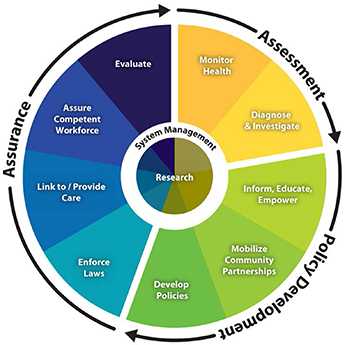Resources Organized by Essential Services

Find tools to help your program fill performance gaps and contribute to larger performance improvement efforts such as voluntary public health accreditation. This list provides our resources indexed by the 10 Essential Environmental Public Health Services.
To learn more about these services and other tools supporting environmental health involvement in performance improvement, explore our new performance improvement resource page.
1. Monitor environmental and health status to identify and solve community environmental public health problems
- Environmental Health Specialists Network (EHS-Net)
- Environmental Health Specialists Network Information System
- Healthy Housing Inspection Manual
- Integrated Pest Management: Conducting Urban Rodent Surveys [PDF - 1.34 MB]
- Network for Aquatic Facility Inspection Surveillance
- National Environmental Assessment Reporting System (NEARS)
- Protocol for Assessing Community Excellence in Environmental Health
- Safe Water for Community Health (Safe WATCH)
2. Diagnose and investigate environmental public health problems and health hazards in the community
- Environmental Investigations
- Healthy Housing Inspection Manual
- Integrated Pest Management: Conducting Urban Rodent Surveys [PDF - 1.34 MB]
3. Inform, educate, and empower people about environmental public health issues
- CDC Vital Signs on Legionnaires’ Disease: Use Water Management Programs in Buildings To Help Prevent Outbreaks
- Drinking Water Advisory Communication Toolbox
- Environmental Health Specialists Network Plain Language Study Findings
- Healthy Housing Reference Manual
- Improving Environmental Public Health Services Performance to Meet Community Needs [PDF - 1.46 MB]
- Integrated Pest Management: Conducting Urban Rodent Surveys [PDF - 1.34 MB]
- Publications, Fact Sheets, and Infographics
4. Mobilize community partnerships and actions to identify and solve environmental health problems

- Drinking Water Advisory Communication Toolbox
- Emergency Water Supply Planning Guide for Hospitals and Health Care Facilities
- Environmental Public Health Performance Standards (EnvPHPS) and the EnvPHPS Assessment Toolkit
- Healthy Housing Inspection Manual
- Protocol for Assessing Community Excellence in Environmental Health
- Rodent Control After a Disaster
5. Develop policies and plans that support individual and community environmental public health efforts
- Developing a Water Management Program to Reduce Legionella Growth and Spread in Buildings: A Practical Guide to Implementing Industry Standards
- Drought Guidance for Public Health Professionals – When Every Drop Counts
- Emergency Water Supply Planning Guide for Hospitals and Health Care Facilities
- Guidance on Microbial Contamination in Previously Flooded Outdoor Areas
- Model Aquatic Health Code
- Tools and Guidance for Environmental Health Practitioners
- Water Safety Plans
6. Enforce laws and regulations that protect environmental public health and ensure safety
Note: EHSB/CDC is not a regulatory agency. The following EHSB resources may be useful for agencies responsible for enforcing laws and regulations.
7. Link people to needed environmental public health services and assure the provision of environmental public health services when otherwise unavailable

- Safe Water for Community Health (Safe WATCH) Tools and Promotional Materials
- Technical assistance requests and environmental investigations
8. Assure a competent environmental public health workforce
- Career Resource Guide for Uniformed Services Environmental Health Practitioners [PDF - 3.34 MB]
- Cooperative agreement with Association of Environmental Health Accredited Programs
- E-Learning on Environmental Assessment of Foodborne Illness Outbreaks
- Environmental Health Competency Project: Recommendations for Core Competencies for Local Environmental Health Practitioners
- Environmental Health Training in Emergency Response (EHTER)
- Environmental Public Health Online Courses (EPHOC)
- National Environmental Public Health Internship Program in partnership with NEHA
- Summer Program in Environmental Health (SUPEH)
- Training and Workforce Development Resources for Environmental Practitioners
- Vector Control for Environmental Health Professionals (VCEHP)
9. Evaluate effectiveness, accessibility, and quality of personal and population-based environmental public health services
- Environmental Public Health Performance Standards
- Improving Environmental Public Health Services Performance to Meet Community Needs [PDF - 1.46 MB]
- Logic Model to Improve Program Performance and Control Drinking Water Exposures
10. Research for new insights and innovative solutions to environmental public health problems
- Environmental Health Specialists Network (EHS-Net)
- Environmental Health Specialists Network Food Safety Study Tools
- Food Safety Research Findings in Plain Language
- Global Water, Sanitation, and Hygiene Research
- Onsite Wastewater System Nitrogen Contributions to Groundwater in Coastal North Carolina [PDF - 383 KB]
- Practice-Based Research on Food Safety and Water Protection
- Page last reviewed: March 4, 2016
- Page last updated: January 5, 2017
- Content source:


 ShareCompartir
ShareCompartir